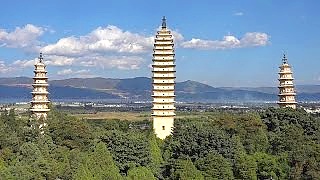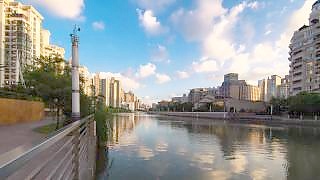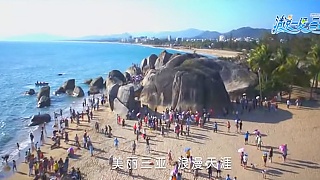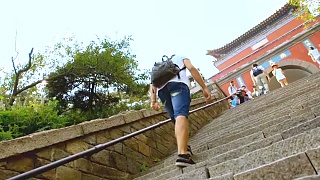With Sun Kissed Bucket List ...
[640],shadow=true,start=,stop=XiZhou Ancient Town Visitor Guide
XiZhou Ancient Town is a gem of Yunnan Province, located approximately 20 kilometers from Dali’s old town. Nestled along the shores of the serene Erhai Lake, XiZhou offers a unique blend of rich Bai culture, stunning ancient architecture, and a tranquil environment, making it a must-visit for travelers seeking a more intimate and traditional experience.
Overview
- Location: XiZhou is situated within the Dali Bai Autonomous Prefecture and is renowned for its well-preserved Bai minority culture.
- Famous For: Traditional Bai houses, ancient courtyards, folk performances, unique local cuisine, and vibrant markets.
Getting There
- From Dali: You can take a bus or taxi from Dali Old Town (20-30 minutes).
- From Kunming: XiZhou is about a 5-hour drive from Kunming. Buses to Dali are available, and from Dali, you can take local transportation to XiZhou.
- Best Time to Visit: Spring (April-May) and autumn (September-October).
Top Attractions in XiZhou
- Yan Family Courtyard (Yan Jia Da Yuan): The most famous ancient residence in XiZhou, showcasing traditional Bai architecture with beautiful wood carvings, white-washed walls, and murals.
- Bai Minority Culture and Houses: Explore over 150 well-preserved traditional Bai houses with intricate designs and courtyards.
- XiZhou Morning Market: A bustling market full of fresh produce, traditional snacks, and local crafts. Arrive early (7 AM – 9 AM) to experience the market at its liveliest.
- Erhai Lake: A stunning lake where you can walk, cycle, or take boat rides to enjoy the natural beauty.
- Shuanglang Town: A trendy nearby town famous for its artistic vibe and boutique guesthouses. A perfect day trip from XiZhou.
Cultural Experiences
- Bai Minority Dress and Dance: Experience colorful traditional Bai clothing and catch performances of traditional dances during festivals or market days.
- Tea Culture at XiZhou: Enjoy traditional tea-tasting experiences in local homes or guesthouses.
Local Delicacies
- XiZhou Baba (喜洲粑粑): A crispy, savory (or sweet) flatbread made from wheat flour. Try it fresh from street vendors.
- Dali Cheese (Rushan, 乳扇): A Bai specialty cheese, often grilled or fried, that you can find throughout the town.
- Erhai Fish: Fresh fish dishes prepared from the lake's bounty, best enjoyed at lakeside restaurants.
- Rose Petal Cake (玫瑰饼): A delicate pastry filled with rose petal jam. This treat is especially famous in XiZhou, where roses are grown locally. Its fragrant sweetness makes it a popular souvenir.
Where to Stay
- Local Homestays: Family-run guesthouses, often in traditional Bai homes, offering an intimate experience of Bai culture.
- Boutique Hotels: For more luxury, boutique hotels combine modern amenities with traditional architecture.
Tips for Visitors
- Language: Most people speak the local Bai dialect, but Mandarin Chinese is sufficient for communication. English is not widely spoken.
- Respect Local Customs: Dress modestly and ask permission before photographing people.
- Shopping: Support local artisans by purchasing handmade textiles, embroidery, and silverware from the markets.
Nearby Attractions
- Dali Old Town: A larger, more developed town known for its old city walls, temples, and lively atmosphere.
- Cangshan Mountain: Offers hiking trails, cable cars, and panoramic views of Erhai Lake and Dali’s landscape.
Conclusion
XiZhou Ancient Town is an ideal destination for those wanting to immerse themselves in authentic Bai culture, ancient architecture, and the peaceful lakeside environment of Yunnan. Whether you're exploring ancient homes, tasting local delicacies, or enjoying the beauty of Erhai Lake, XiZhou provides a rich cultural experience in a relaxed setting.
Dali, located in Yunnan Province in southwestern China, is a charming and culturally rich destination that attracts visitors with its stunning natural scenery, ancient history, and vibrant local culture. Here's a guide for visitors to Dali:
Historical and Cultural Significance:
Ancient City: Dali Ancient City, also known as Dali Old Town, is a well-preserved historical town that dates back over 1,000 years. It served as the capital of the Kingdom of Dali during the Tang Dynasty and later as an important trading post on the ancient Tea Horse Road.
Bai Minority Culture: Dali is home to the Bai ethnic minority, whose unique culture and traditions are evident throughout the region. Visitors can explore Bai villages, interact with locals, and learn about their traditional customs, architecture, and craftsmanship.
Top Attractions:
Erhai Lake: One of Dali's most iconic natural attractions is Erhai Lake, a vast freshwater lake surrounded by picturesque landscapes. Visitors can take boat cruises on the lake, cycle along its shores, or hike to viewpoints for panoramic views of the water and surrounding mountains.
Three Pagodas of Chongsheng Temple: Located just outside Dali Ancient City, the Three Pagodas are iconic symbols of the region and date back to the Tang Dynasty. The pagodas are set against the backdrop of Cangshan Mountain and are surrounded by lush gardens and temples.
Cangshan Mountain: Cangshan Mountain is a scenic mountain range that towers over Dali and offers numerous hiking trails, scenic viewpoints, and opportunities for outdoor adventure. Visitors can hike to waterfalls, explore alpine meadows, and enjoy panoramic views of the valley below.
Xizhou Ancient Town: Xizhou Ancient Town is another well-preserved historical town near Dali, known for its traditional Bai architecture, historic courtyards, and vibrant market streets. Visitors can wander through the town's narrow alleyways, visit ancient temples, and sample local delicacies.
Cultural Experiences:
Bai Architecture: Explore the distinctive Bai architecture found throughout Dali, characterized by white-washed walls, gray tiled roofs, and intricately carved wooden decorations. Visitors can tour traditional Bai homes, visit ancient temples, and learn about local building techniques.
Cultural Performances: Experience traditional Bai music, dance, and theater performances at local venues and cultural centers in Dali. These performances often showcase traditional costumes, musical instruments, and storytelling techniques unique to the Bai culture.
Practical Tips:
Weather: Dali enjoys a mild climate year-round, but the best time to visit is during the spring (March to May) and autumn (September to November) when the weather is most pleasant and the landscapes are lush and green.
Transportation: Getting around Dali is convenient with its network of buses, taxis, and bicycles. Many attractions are within walking distance of Dali Ancient City, while others can be reached by public transportation or organized tours.
Accommodation: Dali offers a range of accommodation options, including boutique hotels, guesthouses, and traditional courtyard homes. Staying in Dali Ancient City allows visitors to immerse themselves in the town's historic atmosphere and vibrant culture.
Dali offers a captivating blend of natural beauty, cultural heritage, and traditional charm, making it an enchanting destination for visitors seeking to explore the treasures of Yunnan Province. Whether hiking in the mountains, wandering through ancient towns, or immersing oneself in local culture, Dali has something to offer for every traveler.

 XiZhou ancient town, near DaLi in YunNan province
XiZhou ancient town, near DaLi in YunNan province
























